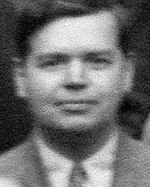John C. Slater, Date of Birth, Place of Birth, Date of Death
TweetJohn C. Slater
American physicist
 Date of Birth: 22-Dec-1900
Date of Birth: 22-Dec-1900
 Place of Birth: Oak Park, Illinois, United States
Place of Birth: Oak Park, Illinois, United States
Date of Death: 25-Jul-1976
Profession: physicist, chemist, university teacher
Nationality: United States
Zodiac Sign: Capricorn 
About John C. Slater
- John Clarke Slater (December 22, 1900 – July 25, 1976) was a noted American physicist who made major contributions to the theory of the electronic structure of atoms, molecules and solids.
- He also made major contributions to microwave electronics.
- He received a B.S.
- in Physics from the University of Rochester in 1920 and a Ph.D.
- in Physics from Harvard in 1923, then did post-doctoral work at the universities of Cambridge (briefly) and Copenhagen.
- On his return to the U.S.
- he joined the Physics Department at Harvard. In 1930, Karl Compton, the President of MIT, appointed Slater as Chairman of the MIT Department of Physics.
- He recast the undergraduate physics curriculum, wrote 14 books between 1933 and 1968, and built a department of major international prestige.
- During World War II, his work on microwave transmission, done partly at the Bell Laboratories and in association with the MIT Radiation Laboratory, was of major importance in the development of radar. In 1950, Slater founded the Solid State and Molecular Theory Group (SSMTG) within the Physics Department.
- The following year, he resigned the chairmanship of the department and spent a year at the Brookhaven National Laboratory of the Atomic Energy Commission.
- He was appointed Institute Professor of Physics and continued to direct work in the SSMTG until he retired from MIT in 1965, at the mandatory retirement age of 65. He then joined the Quantum Theory Project of the University of Florida as Research Professor, where the retirement age allowed him to work for another five years.
- The SSMTG has been regarded as the precursor of the MIT Center for Materials Science and Engineering (CMSE).
- His scientific autobiography and three interviews present his views on research, education and the role of science in society. In 1926, he had married Helen Frankenfeld.
- Their three children (Louise Chapin, John Frederick, and Clarke Rothwell) all followed academic careers.
- Slater was divorced and in 1954 he married Rose Mooney, a physicist and crystallographer, who moved to Florida with him in 1965.In 1964, Slater and his then ninety-two-year-old father, who had headed the Department of English at the University of Rochester many years earlier, were awarded honorary degrees by that university.
- Slater's name is part of the terms Bohr-Kramers-Slater theory, Slater determinant and Slater orbital. Slater died in Sanibel Island, Florida in 1976.
Read more at Wikipedia
See Also
- Famous People's Birthdays on 22 December, United States
- Famous People's Birthdays in December, United States
- Famous physicist's Birthdays on 22 December, United States
- Famous physicist's Birthdays in December, United States
- Famous chemist's Birthdays on 22 December, United States
- Famous chemist's Birthdays in December, United States
- Famous university teacher's Birthdays on 22 December, United States
- Famous university teacher's Birthdays in December, United States


